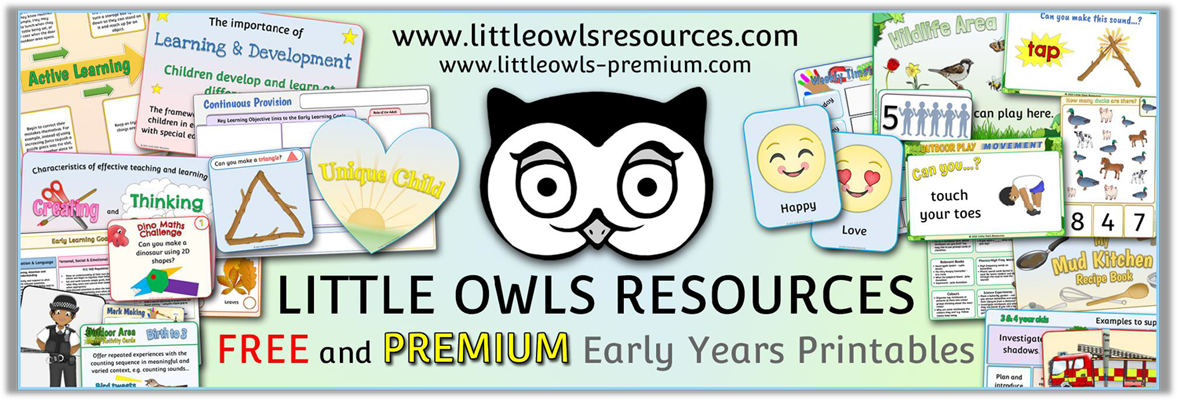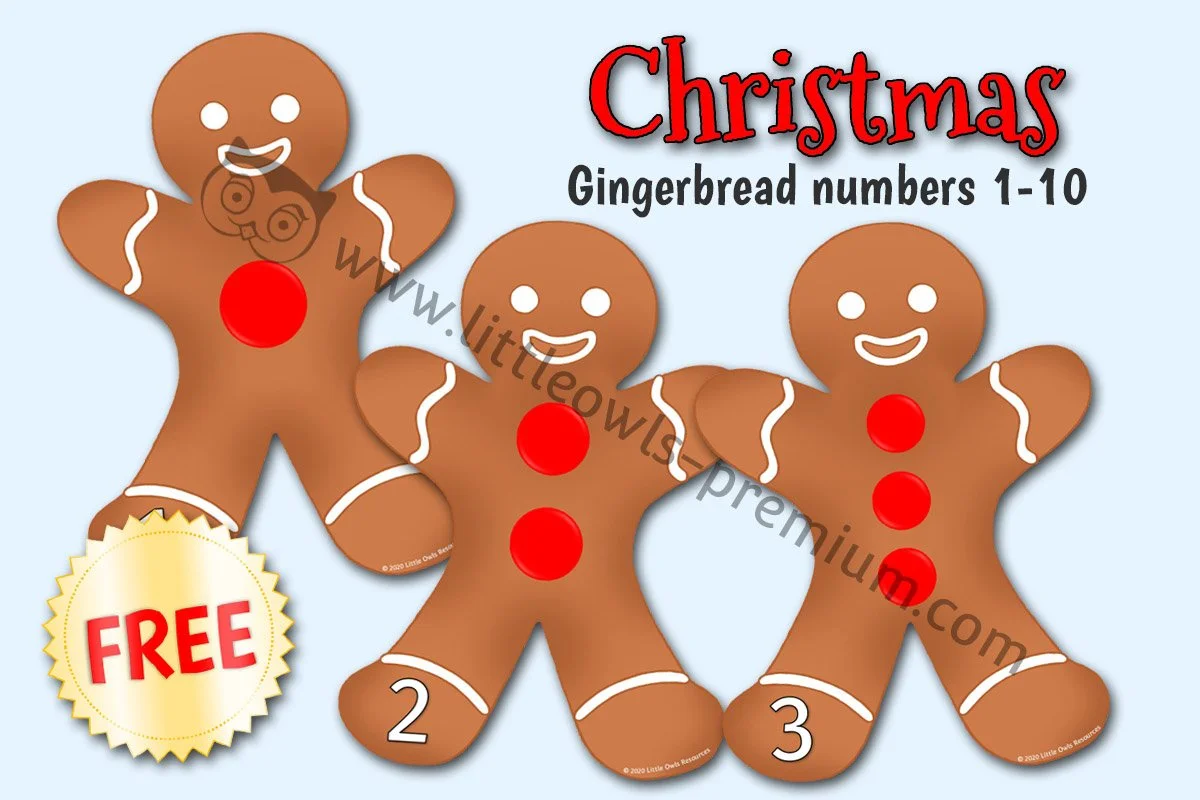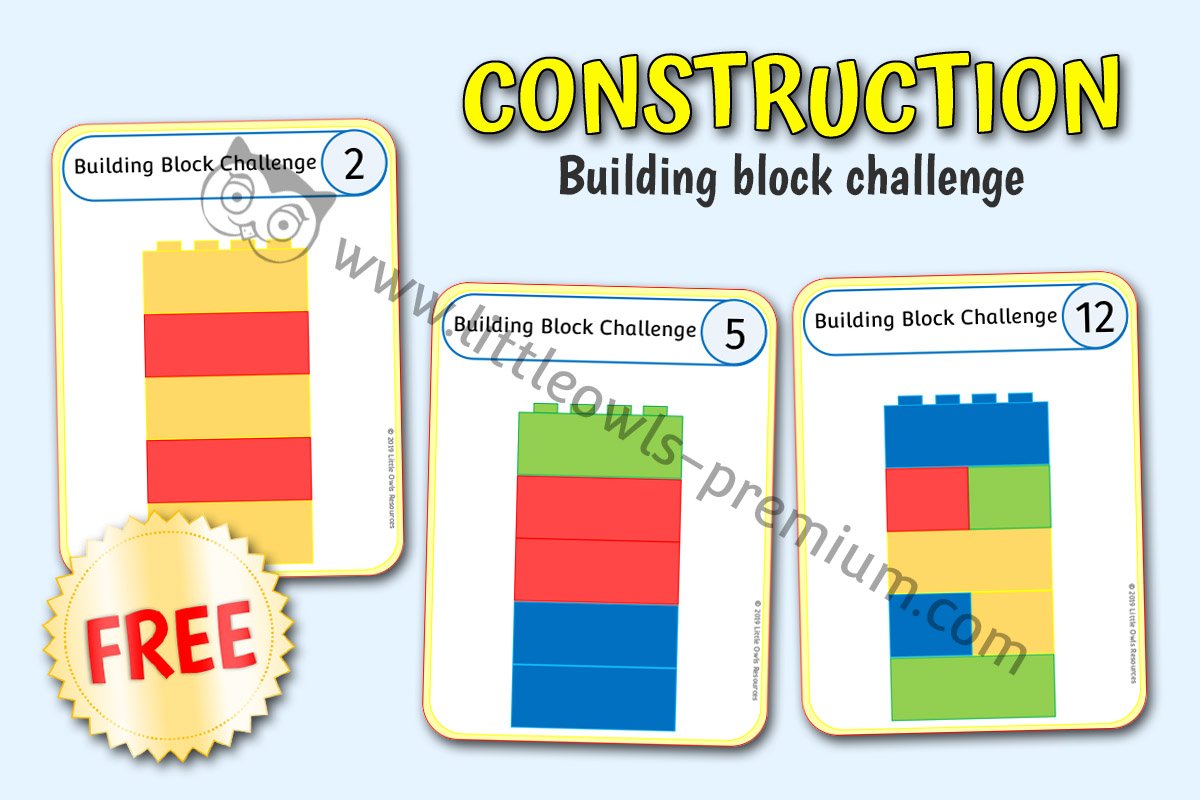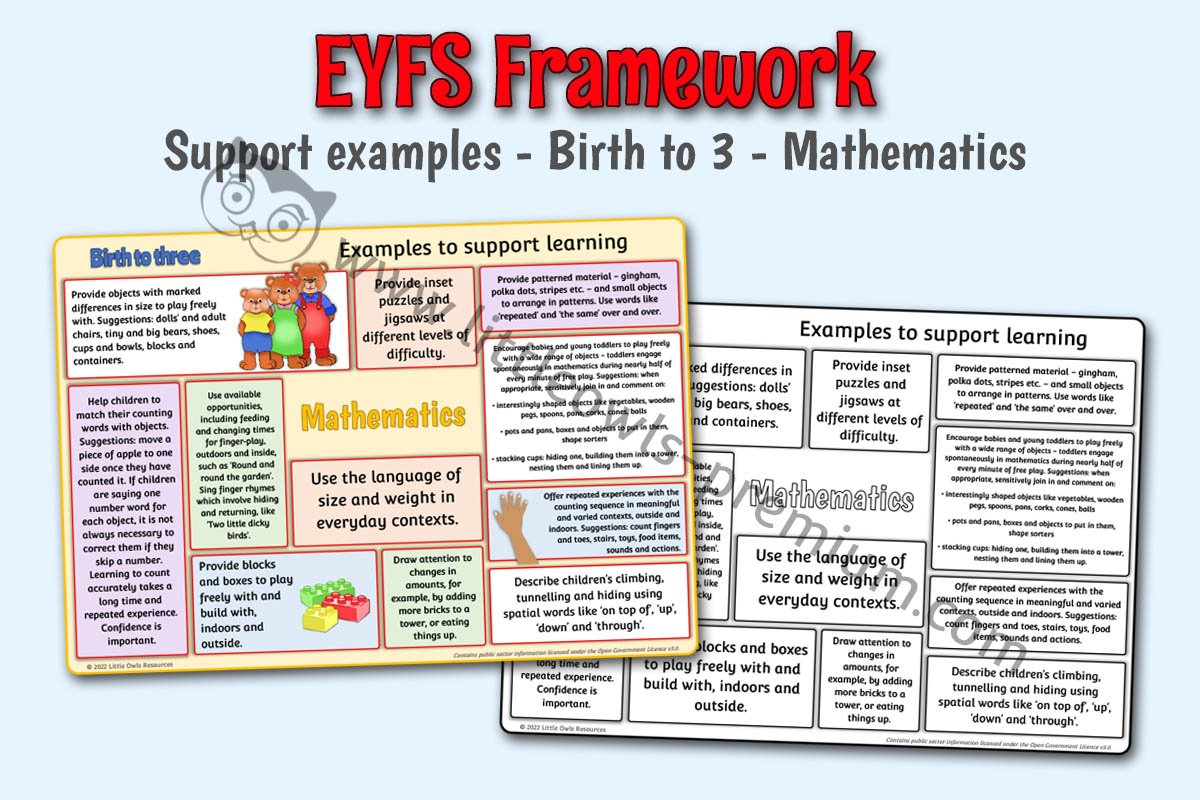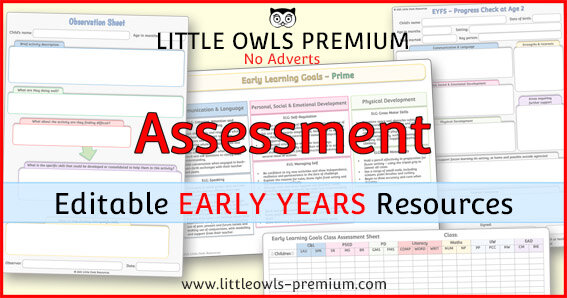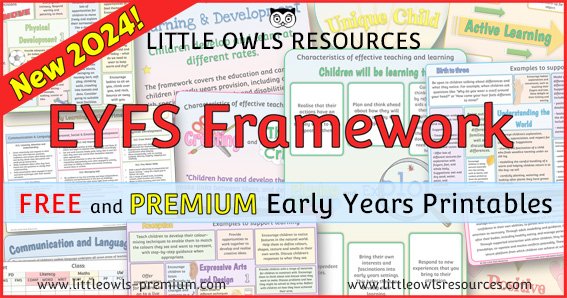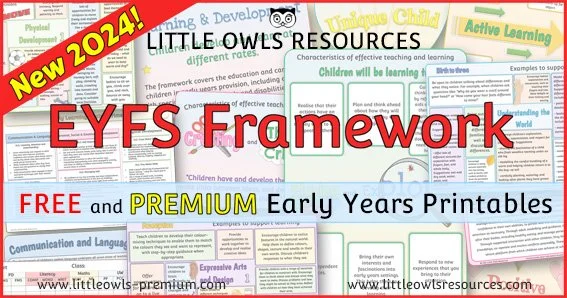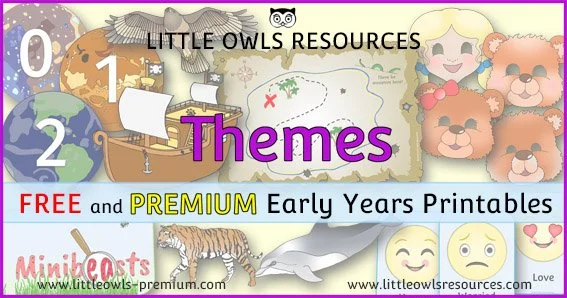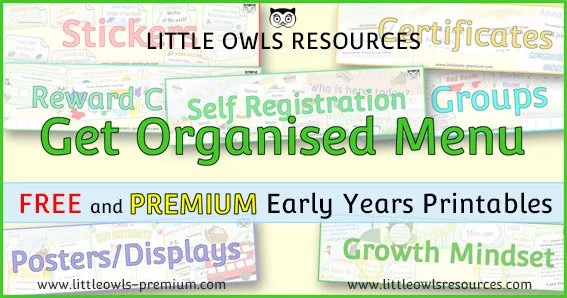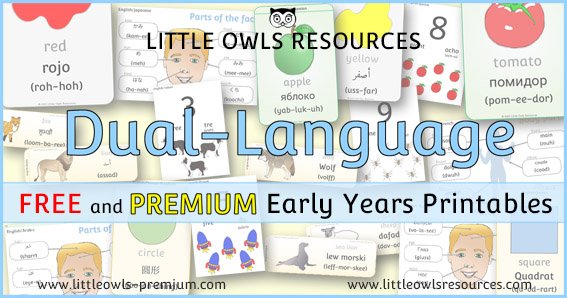<<-BACK TO ‘AREAS OF LEARNING’ MENU
Mathematics (Maths) - EYFS/Early Years activities, displays and ideas
SECTIONS ON THIS PAGE:
Free sample ‘Mathematics’ resources
What do we mean by ‘Mathematics’?
Examples of how to support ‘Mathematics’ learning and development
Birth to 3
3 and 4 Year Olds
Reception
Search our ‘Mathematics’ resources by…
Keywords and phrases
Topic
Related special dates - National Numeracy Day - Number Day (NSPCC) (Scroll down to find out more)
If you are not a member already, become a ‘Free Access’ member here. This will give you access to resources within the ‘Free Sample Resources’ sections at the top of most pages and ‘Special Dates Calendars’. Some whole topics are even free! Find out more about all of our membership options here. If you are already a member… thank-you! x
Top Pick FREE SAMPLE ‘Mathematics’ RESOURCES
(Click on the images below to find out more)
Please note that both editable (docx file) and non-editable (pdf file) versions are available for the vast majority of resources on this website. (Editable files require Microsoft Word to work at optimum level and Non-Editable files require a pdf viewer.)
WHAT DO WE MEAN BY ‘Mathematics’?
“Developing a strong grounding in number is essential so that all children develop the necessary building blocks to excel mathematically. Children should be able to count confidently, develop a deep understanding of the numbers to 10, the relationships between them and the patterns within those numbers. By providing frequent and varied opportunities to build and apply this understanding - such as using manipulatives, including small pebbles and tens frames for organising counting - children will develop a secure base of knowledge and vocabulary from which mastery of mathematics is built. In addition, it is important that the curriculum includes rich opportunities for children to develop their spatial reasoning skills across all areas of mathematics including shape, space and measures. It is important that children develop positive attitudes and interests in mathematics, look for patterns and relationships, spot connections, ‘have a go’, talk to adults and peers about what they notice and not be afraid to make mistakes.” Development Matters, July 2021
EXAMPLES OF HOW TO SUPPORT ‘Mathematics’ LEARNING AND DEVELOPMENT
Extracted from Development Matters; non-statutory curriculum guidance for the early years foundation stage, revised July 2021. Includes colour and black and white versions.
Files contain public sector information licensed under the Open Government Licence v3.0.
When considering the support you provide for the learning and development of ‘Mathematics’ within your setting, you may find resources on the following pages useful…
Search our ‘Mathematics’ Resources by…
KEY WORDS & PHRASES:
Estimates
(Any text without a link indicates that we are working on this area.)
TOPIC:
Related Special Dates
National Numeracy Day
National Numeracy Day is an annual UK-wide initiative dedicated to enhancing numeracy skills and confidence among individuals of all ages.
📊 What Is National Numeracy Day?
Launched in 2018 by the independent charity National Numeracy, this day aims to:
Highlight the importance of numeracy in everyday life.
Encourage individuals to improve their confidence and skills with numbers.
Provide free resources and support to help people tackle numeracy challenges.
The initiative is supported by various organisations, including founding supporter KPMG, and has engaged over 10,000 partners, such as schools, employers, and community groups.
🧮 How to Get Involved
For Individuals:
Take the National Numeracy Challenge: A free, online tool to assess and improve your numeracy skills at your own pace .
Participate in the Big Number Natter: Engage in conversations about numbers and share experiences to build confidence.
Access Resources: Utilise free tips, advice, and activities designed for various age groups.
For Schools and Organisations:
Join the Number Heroes Competition: Encourage children to explore how numeracy applies to their dream jobs or hobbies, with opportunities to win prizes .
Utilise the Family Maths Toolkit: Access over 200 activities aimed at children aged 3–13 to promote numeracy in engaging ways.
Host Events: Organise workshops, challenges, or discussions to foster a numeracy-positive environment.
🌐 Why It Matters
Numeracy is essential for daily tasks such as budgeting, shopping, and understanding financial information. Improving numeracy skills can lead to better job prospects, increased confidence, and enhanced decision-making abilities. National Numeracy Day serves as a catalyst for individuals to take the first step towards numerical confidence and competence.
For more information, resources, and to participate in National Numeracy Day, visit the official website: www.nationalnumeracy.org.uk/numeracyday.
Number Day (NSPCC)
Number Day is an annual fundraising event organised by the NSPCC (National Society for the Prevention of Cruelty to Children). It typically takes place in February, though schools and nurseries can choose to hold their Number Day on any date that suits them. The event encourages children to 'Dress up for Digits' and participate in fun, engaging maths activities, all while raising money to support the vital work of the NSPCC in protecting children across the UK.
The main educational thrust of Number Day is to make maths enjoyable and accessible for children of all ages and abilities, demonstrating its relevance in everyday life. It aims to foster a positive attitude towards numeracy, build confidence in mathematical skills, and show children that maths can be creative, practical, and fun. Crucially, by linking the enjoyment of maths with fundraising for the NSPCC, it subtly introduces children to the concept of charity, empathy, and helping others, connecting their learning to a meaningful cause.
Activities for EYFS and KS1 Practitioners and Parents:
Here are some engaging and age-appropriate activities to celebrate Number Day and make maths come alive for young children:
Dress Up for Digits: Encourage children to come dressed as a number, a mathematical symbol, or in clothes with numbers on them (e.g., a football shirt, a spotty top for counting spots). This instantly creates a fun and visual link to numbers.
Number Scavenger Hunt: Hide numbers (or objects with numbers on them) around the classroom, home, or outdoor space. Children then find them and either put them in order, match them to a quantity, or say the number aloud.
Count Everything!: Dedicate the day to counting. Count steps, count jumps, count toys, count how many red items are in the room. Make counting a continuous, playful activity.
Maths-Themed Story Time: Read books that incorporate counting, patterns, or simple problem-solving.
Playdough Numbers & Shapes: Provide playdough for children to create numbers and 2D or 3D shapes. They can also use number cutters.
Outdoor Maths Challenges:
Nature Counting: Collect natural items (leaves, pebbles, twigs) and count them, sort them by size, or make patterns.
Target Throw: Draw chalk numbers on the ground and have children throw beanbags or soft balls onto a target number.
Number Obstacle Course: Incorporate numbers into a simple obstacle course (e.g., "Hop 5 times," "Crawl under 2 hoops," "Jump over 3 lines").
Creative Number Art:
Number Collages: Provide old magazines, newspapers, and craft materials. Children can cut out numbers they find and create a number collage.
Counting Prints: Use paint and different objects (corks, sponges, fingers) to make prints, then count how many prints they made.
Baking with Numbers: Follow a simple recipe that involves counting and measuring ingredients (e.g., counting spoonfuls of flour, measuring cups of milk). This makes maths very practical and tangible.
NSPCC Fundraising Activities: Explain simply to children that the money raised helps children who need support. You could have a "guess the number of sweets in the jar" competition, a sponsored "maths challenge" (e.g., how many star jumps can you do in 30 seconds, or how many times can you count to 10), or ask for a small donation for dressing up.
Shape Exploration: Go on a shape hunt around the environment, identifying circles, squares, triangles, and rectangles. Talk about their properties (e.g., "a square has 4 straight sides").
Official Number Day / NSPCC Website: For more information, to register for resources, and to learn more about the vital work of the NSPCC, please visit their official website: www.nspcc.org.uk
MORE WAYS TO SEARCH ON LITTLE OWLS - PREMIUM…
(Select the buttons below to visit our menu pages)
This page contains public sector information licensed under the Open Government Licence v3.0.
